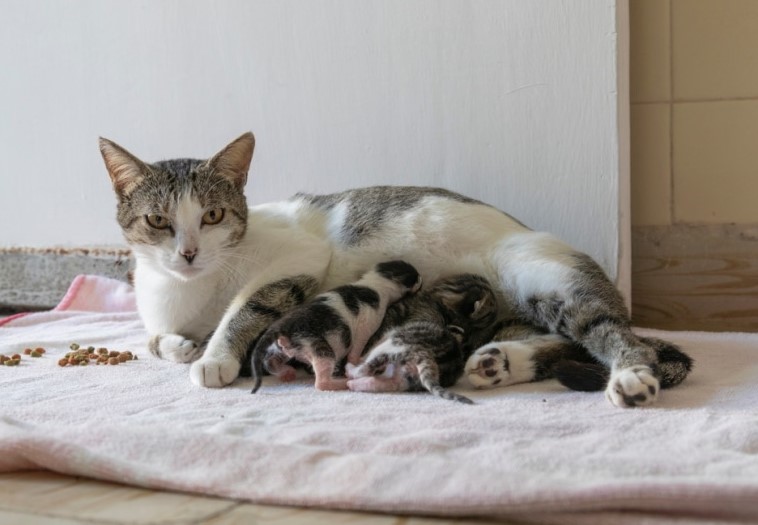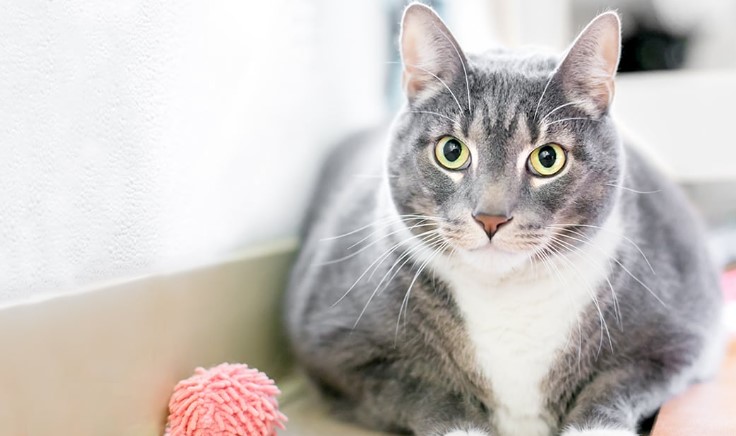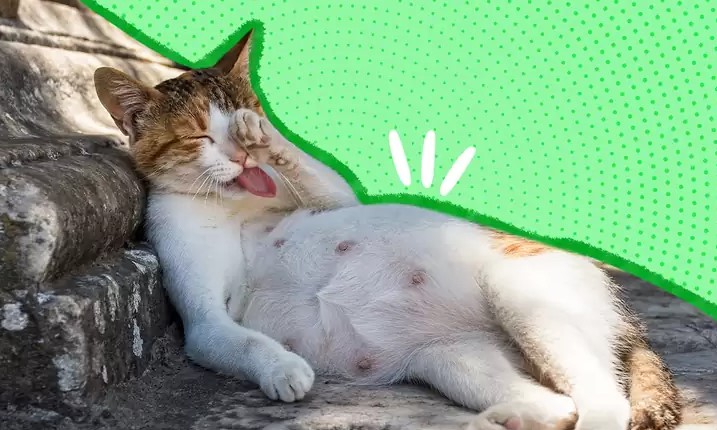One of the common concerns that cat owners may have after their feline companion gives birth is the noticeable weight loss. It is essential to understand that postpartum weight loss in cats is a natural phenomenon. Just as humans lose weight after childbirth, cats also experience a similar process as their bodies adjust to the changes associated with pregnancy and lactation.
Importance of Monitoring Your Cat’s Health Post-Birth
Monitoring your cat’s health post-birth is crucial for ensuring her well-being and identifying any potential health issues. While postpartum weight loss is normal, it is essential to distinguish between healthy weight loss and excessive weight loss that may indicate an underlying problem. By closely monitoring your cat’s weight and overall health, you can take appropriate steps to support her during this period and ensure a smooth recovery. In this article, we will delve into the reasons behind postpartum weight loss in cats and provide helpful tips to promote your cat’s health and well-being during this time.
The Normal Postpartum Weight Loss Process

After giving birth, cats go through a natural postpartum weight loss process. This weight loss can be attributed to two main factors: shedding excess pregnancy weight and the utilization of fat stores for milk production.
- Shedding Excess Pregnancy Weight: Cats gain weight during pregnancy to support the growth and development of their kittens. Once the kittens are born, the mother cat naturally begins to shed the excess weight gained during pregnancy. This weight loss occurs gradually over time and is a normal part of the postpartum period.
- Utilization of Fat Stores for Milk Production: Milk production is an energy-intensive process for mother cats. To provide nourishment for their kittens, mother cats utilize the fat stores they accumulated during pregnancy. The fat reserves serve as a source of energy for milk production, and as a result, the mother cat may experience further weight loss during this period.
It’s important to note that this postpartum weight loss should be gradual and not excessive. Cats should still maintain a healthy body condition and not become excessively thin. Monitoring your cat’s weight and body condition regularly can help you ensure that she is experiencing normal postpartum weight loss without any complications.
Factors Influencing Postpartum Weight Loss
Several factors can influence the extent and duration of postpartum weight loss in cats. Understanding these factors can help you assess your cat’s individual situation and ensure her well-being during this period.
- Size and Breed Variations: Cats come in various sizes and breeds, and these differences can affect their postpartum weight loss. Smaller cats may naturally lose less weight compared to larger cats. Additionally, certain breeds may have different metabolic rates or body compositions, which can impact the speed and extent of weight loss after giving birth.
- Number of Kittens in the Litter: The number of kittens in a litter can influence postpartum weight loss in mother cats. Cats with larger litters may experience more significant weight loss due to the increased demand for milk production. Nursing multiple kittens requires more energy, leading to more substantial utilization of the mother cat’s fat stores.
- Age and Overall Health of the Mother Cat: The age and overall health of the mother cat play a crucial role in postpartum weight loss. Younger cats may recover more quickly and regain their pre-pregnancy weight faster than older cats. Additionally, any pre-existing health conditions or nutritional deficiencies can affect the mother cat’s ability to maintain a healthy weight post-birth.
It’s important to note that while these factors can influence postpartum weight loss, they should not be the sole indicators of your cat’s health. Regular monitoring, consultation with a veterinarian, and considering the overall well-being of the mother cat are essential for ensuring a healthy recovery after giving birth.
Nutritional Requirements During the Postpartum Period

Proper nutrition is vital for a nursing cat’s health during the postpartum period. Providing a high-quality, balanced diet and ensuring access to ample water are crucial to support her recovery and milk production.
- High-Quality, Balanced Diet for Nursing Cats: A nursing cat has increased nutritional needs due to the energy expended in producing milk. It’s important to provide her with a high-quality, balanced diet specifically formulated for nursing cats. Look for cat foods labeled as “complete and balanced” or specifically designed for lactating cats. These diets should contain optimal levels of protein, fat, and essential nutrients to support the mother cat’s health and milk production.
- Importance of Providing Ample Water: Adequate hydration is essential for a nursing cat’s overall health and milk production. Ensure that fresh, clean water is readily available for your cat at all times. Nursing cats may have an increased thirst due to the demands of lactation, so it’s crucial to monitor their water intake. If you notice any changes in drinking behavior or suspect dehydration, consult your veterinarian.
Proper nutrition and hydration are vital not only for the mother cat’s health but also for the well-being of the kittens. By providing a balanced diet and ample water, you can support the mother cat in producing sufficient milk to nourish her kittens and help her recover from the birthing process. Consulting with a veterinarian can help you determine the specific dietary needs of your nursing cat based on her individual circumstances.
Monitoring Your Cat’s Weight Post-Birth
Regularly monitoring your cat’s weight post-birth is crucial to ensure that she is experiencing healthy postpartum weight loss and recovering properly. Here are two important steps to effectively monitor your cat’s weight:
- Regular Weighing and Recording: Weighing your cat regularly and keeping a record of her weight can provide valuable insights into her postpartum weight loss progress. Use a reliable digital scale designed for weighing small animals and establish a consistent weighing schedule. Record the weight and date in a journal or spreadsheet to track any fluctuations over time. This will help you identify any sudden or excessive weight loss that may require further attention.
- Consulting a Veterinarian for a Professional Evaluation: While monitoring your cat’s weight at home is essential, it’s also crucial to involve a veterinarian for a professional evaluation. Schedule regular check-ups for your cat post-birth, where the veterinarian can assess her overall health, body condition, and weight loss progress. They will have the expertise to determine if the weight loss is within a healthy range or if any additional steps need to be taken to support your cat’s recovery.
By combining regular at-home weigh-ins with professional evaluations from a veterinarian, you can closely monitor your cat’s weight post-birth and ensure that any deviations from the norm are promptly addressed. This collaborative approach will help you maintain the optimal health and well-being of your cat during the postpartum period.
Addressing Potential Health Concerns

During the postpartum period, it’s important to be vigilant and address any potential health concerns that may arise. Here are two key aspects to consider:
- Identifying Signs of Underlying Health Issues: While postpartum weight loss is normal, it’s essential to be aware of signs that may indicate underlying health issues. Monitor your cat for any abnormal behaviors or symptoms, such as excessive weight loss, lethargy, loss of appetite, changes in litter box habits, or signs of distress. These could be indications of medical problems or complications related to the birth. If you notice any concerning signs, contact your veterinarian for guidance and a thorough examination.
- Role of Veterinary Care in Maintaining Cat’s Health: Veterinary care is crucial for maintaining your cat’s health during the postpartum period. Regular check-ups with a veterinarian allow for professional evaluation, early detection of any health issues, and appropriate interventions. Your veterinarian can provide guidance on postpartum care, assess your cat’s weight loss progress, and address any concerns you may have. They can also offer advice on nutrition, supplementation, and vaccinations to ensure your cat’s well-being.
By being attentive to your cat’s behavior and promptly seeking veterinary care when needed, you can address potential health concerns and provide your cat with the necessary support during the postpartum period. Regular veterinary check-ups play a vital role in maintaining your cat’s overall health and ensuring a successful recovery after giving birth.
Gradual Weight Gain Strategies
After the postpartum weight loss phase, it’s important to focus on helping your cat regain a healthy weight. Here are two strategies to promote gradual weight gain:
- Slow Transition to Normal Diet: To support weight gain, gradually transition your cat from her postpartum diet to her normal diet. Start by mixing small amounts of her regular food with the postpartum diet and gradually increase the proportion of regular food over a week or two. This gradual transition will help prevent any digestive upset while providing the necessary nutrients for weight gain. Ensure that her regular diet is appropriate for her life stage and provides balanced nutrition.
- Incorporating Exercise and Playtime: Along with a balanced diet, incorporating exercise and playtime can help stimulate your cat’s appetite and promote weight gain. Engage your cat in interactive play sessions using toys that encourage physical activity. This not only helps burn calories but also provides mental stimulation. Gradually increase the duration and intensity of playtime as your cat becomes more active and energetic. However, ensure that exercise is appropriate for her postpartum recovery and consult your veterinarian for guidance.
Remember, the goal is to promote gradual weight gain in a healthy manner. Monitor your cat’s weight regularly during this phase and consult with your veterinarian if you have any concerns or questions about her progress. Each cat is unique, so it’s important to tailor the weight gain strategies to suit your cat’s individual needs and overall health.
By implementing a slow transition to a normal diet and encouraging exercise and playtime, you can help your cat regain a healthy weight while promoting her overall well-being.
Ensuring Adequate Milk Production
Ensuring that your cat has an adequate milk supply is crucial for the health and growth of her kittens. Here are two important aspects to consider:
- Proper Nursing Technique and Encouragement: Encourage proper nursing technique to help stimulate milk production and ensure that the kittens are receiving enough nourishment. Provide a quiet and comfortable space for nursing, free from distractions or disturbances. Gently guide the kittens to the mother’s nipples and ensure that they latch on correctly. Monitor the nursing sessions to ensure that all kittens have equal access to the nipples and are nursing effectively. Gentle stimulation of the mother’s nipples can also help promote milk flow.
- Recognizing Signs of Insufficient Milk Supply: It’s essential to be aware of signs that may indicate an insufficient milk supply. If the kittens are constantly crying, seem restless or unsatisfied after nursing, or show signs of poor weight gain, it could be an indication that the mother cat is not producing enough milk. Additionally, if the mother cat’s mammary glands appear empty or soft between nursing sessions, it may suggest insufficient milk production. Consult your veterinarian if you notice any of these signs to address the issue promptly.
If you suspect that the mother cat is not producing enough milk, it’s important to seek veterinary guidance. The veterinarian can assess the situation, provide advice on promoting milk production, and discuss potential solutions such as supplemental feeding or fostering the kittens if necessary.
By focusing on proper nursing technique, providing a conducive environment, and recognizing signs of insufficient milk supply, you can help ensure that your cat has an adequate milk supply to support the health and growth of her kittens.
Managing Stress and Environmental Factors
Creating a calm and comfortable environment for your cat during the postpartum period is essential for her well-being and the successful rearing of her kittens. Here are two important strategies to manage stress and environmental factors:
- Providing a Calm and Comfortable Environment: Ensure that your cat has a dedicated, quiet, and secluded area where she can nurse and care for her kittens without disturbances. This space should be away from loud noises, high foot traffic areas, and other pets. Set up a cozy nesting area with soft bedding and provide a comfortable temperature to promote relaxation. Creating a peaceful environment will help reduce stress and allow your cat to focus on caring for her kittens.
- Minimizing Changes or Disruptions: Minimize any unnecessary changes or disruptions to your cat’s routine and environment during the postpartum period. Cats are sensitive to changes, and disruptions can cause stress and anxiety, which may affect their ability to nurse and care for their kittens. Avoid rearranging furniture, introducing new pets, or making significant changes to their living space during this time. Maintain a consistent schedule for feeding, cleaning, and interactions to provide stability and reduce stress.
By providing a calm and comfortable environment while minimizing changes and disruptions, you can help reduce stress levels for your cat during the postpartum period. This will contribute to a positive and nurturing environment for her and her kittens, promoting their overall well-being and allowing for successful kitten rearing.
Seeking Veterinary Guidance
During the postpartum period, it is important to seek veterinary guidance to ensure the health and well-being of your cat and her kittens. Here are two important aspects of seeking veterinary guidance:
- Professional Advice and Assistance: Veterinary professionals have the knowledge and expertise to provide valuable advice and assistance during the postpartum period. Regular check-ups and consultations with your veterinarian allow them to assess the health of the mother cat, monitor the growth and development of the kittens, and address any concerns or issues that may arise. They can offer guidance on nutrition, weight management, nursing techniques, and overall postpartum care.
- Discussing Supplement Options if Necessary: In some cases, additional supplementation may be necessary to support the health of the mother cat and her kittens. If there are concerns about the mother’s milk production, inadequate weight gain in the kittens, or any other related issues, your veterinarian can discuss the potential need for supplements. They can recommend appropriate supplements and guide you on their proper administration to ensure the nutritional needs of the mother cat and kittens are met.
Remember, each cat and litter is unique, and the guidance of a veterinarian is invaluable in providing tailored advice and solutions for your specific situation. Veterinary professionals can address any medical concerns, offer support and expertise, and ensure that your cat and her kittens receive the best care possible during the postpartum period.
By seeking veterinary guidance, you can have peace of mind knowing that you are receiving professional advice and assistance to ensure the optimal health and well-being of your cat and her kittens.
Conclusion:
Understanding the natural process of postpartum weight loss in cats is crucial for cat owners. It is a normal phenomenon for mother cats to experience weight loss after giving birth as they shed excess pregnancy weight and utilize fat stores for milk production. Monitoring your cat’s weight post-birth is essential to ensure that the weight loss is within a healthy range and that she is recovering properly.
Proper nutrition during the postpartum period is vital for the health and well-being of the mother cat. Providing a high-quality, balanced diet specifically formulated for nursing cats and ensuring ample access to water are important for supporting her recovery and milk production.
Additionally, it is crucial to be aware of factors that can influence postpartum weight loss, such as size and breed variations, the number of kittens in the litter, and the age and overall health of the mother cat. Understanding these factors helps in assessing the individual circumstances of your cat and providing appropriate care.
Addressing potential health concerns, recognizing signs of underlying health issues, and seeking veterinary care are important for maintaining your cat’s health during the postpartum period. Regular monitoring, professional evaluations, and prompt intervention when necessary contribute to the well-being of your cat.
Gradual weight gain strategies, including a slow transition to a normal diet and incorporating exercise and playtime, aid in helping your cat regain a healthy weight after the postpartum weight loss phase.
Managing stress and providing a calm and comfortable environment for the mother cat and her kittens are essential for their overall well-being. Minimizing changes and disruptions helps reduce stress levels and create a nurturing environment.
Finally, seeking veterinary guidance is crucial during the postpartum period. Veterinary professionals can provide professional advice, assistance, and guidance on nutrition, weight management, nursing techniques, and overall postpartum care. They can address any concerns and discuss supplement options if necessary.
By understanding the natural process of postpartum weight loss, ensuring proper nutrition and monitoring, and seeking veterinary guidance, you can contribute to the health, happiness, and well-being of your mother cat and her kittens during this important phase of their lives.
Author Profile

- Shariful is a highly knowledgeable cat trainer and veterinarian who runs a popular blog dedicated to feline care. His expertise in cat behavior, training, nutrition, and health makes his blog an invaluable resource for cat owners and enthusiasts. Shariful's writing is clear and concise, making his advice accessible to readers of all levels of experience. His dedication to the well-being of cats has earned him a loyal following and a reputation as a respected authority in the feline community. Through his blog, Shariful is making a positive impact on the lives of cats and their owners, and his work serves as an inspiration to all who share his passion for feline care.
Latest entries
- June 13, 2023Cat BehaviorWill a Male Cat Attack a Spayed Female? Understanding Feline Behavior and Tips for Peaceful Coexistence
- June 12, 2023Cat TipsCan a Centipede Kill a Cat? Understanding the Risks and Precautions
- June 11, 2023Cat TipsWhy Is My Cat So Skinny After Giving Birth? Understanding Postpartum Weight Loss
- June 10, 2023Cat BehaviorCan Pepperoni Kill A Cat? Understanding the Risks and Taking Precautions